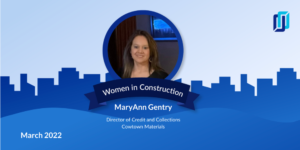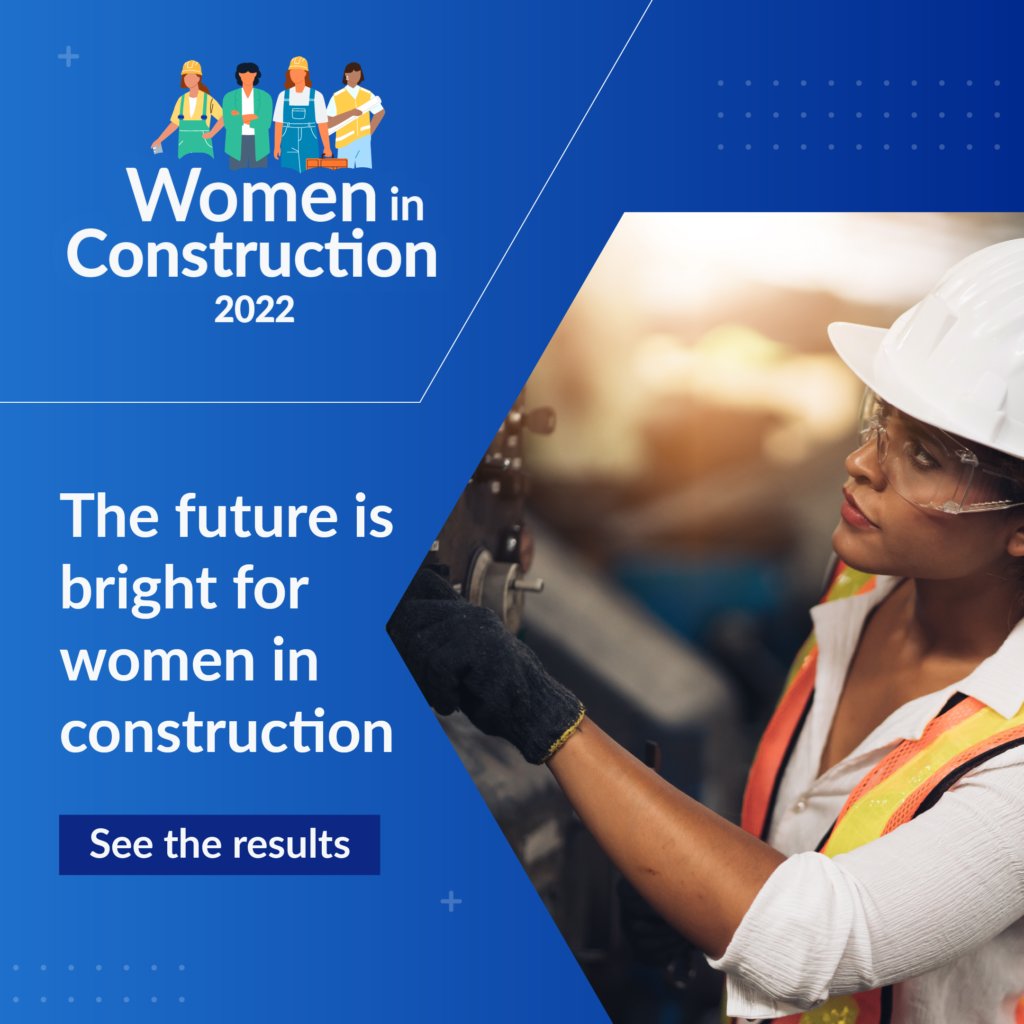
During National Women in Construction Week, Levelset is recognizing and celebrating accomplished women in construction. I sat down with MaryAnn Gentry. MaryAnn is the Director of Credit and Collections for Cowtown Materials. We had the opportunity to discuss her career, the challenges and triumphs of working in construction credit, and working as a woman in a male-dominated industry.
Lori: Tell us about your career journey and how you got to where you are now with Cowtown.
MaryAnn: I have been here at Cowtown for 28 years this year. I’m not gonna say how old I am, but [when I started] I had just had my daughter. I started here part-time, and this is my second job in my whole entire life. I was working at another credit collections company for James Kate Wilson. It was a men’s clothing store, and we did credit and collections for them. And so I was going to college and I could work there, whether I went to school during the day or at night, there were collections that were nationwide. So we had both time slots all the way, west and east. So it worked out for me. I came here and I’ve been here ever since.
So what’s the normal day-to-day look like in your position — or is everything just different every time?
Well, that’s what I like about my job — that it’s not monotonous. We have different personalities for different customers, different scenarios. That’s one of the things that I do like about my job: That it’s not the same thing over and over again. I couldn’t do that. We’re 14 companies, so I’m busy every minute of my day. I go home and I work and need to learn how to shut it off. We keep growing; we’re adding customers. People not paying and people paying. It’s good. I like growth. I like that we’ve merged our companies. So far, so good.

See what women in construction said about their jobs, their coworkers, and the state of the industry.
Very nice. And you said you have 14 companies of it now? Is that nationwide, or just in Texas?
It’s Texas, mainly. And we have one yard in Shreveport, Louisiana.
What skills have you found that are essential? I mean, obviously, you’ve developed your skills over the years, but if you’re just looking at somebody that would be in this position, what skills do you think that they would need to have?
They would need to be a strong person. You have to take the punches, roll with the punches. It can’t be somebody soft doing my position. You’ve gotta stay strong, true, [and] keep to your guidelines and deadlines and everything. You basically have to have good communication skills with your customers.
What is the main challenge that you face in your position?
Well, I mean, it’s adaptable. We might not like it. You can’t be stuck in one thing. You always have to go with the flow and always do better and try to learn more.
I guess the biggest challenge is collections right now and the collection laws changing with our liens and our lien letters and our timelines, just having to adapt to those. It’s a positive thing that’s happened, we just need to adapt to it and we’ll get there.
Learn more: Texas Overhauls Lien Laws by Enacting HB2237
So are you a member of any professional groups or associations — anything that’s helped with your education over the years?
Just NACM [National Association of Credit Managers]. I just go to those classes as I need to, or a refresher class. The last two years, of course, we hadn’t done much because of COVID. So I’d like to get back into that.
So, I mean, you mentioned COVID — what are the most major things that you’ve seen happen, and how have you adjusted to those changes?
Well, we still have to, okay. [We still hear] “I didn’t get my invoice,” or “we didn’t pay our bills because we were out for COVID. ” But we still have to; we still have company policy. We still have to do our letters. I’m sorry, but that’s what we gotta do. We understand, but they also need to understand that we still have to do our job. We still have our rules and policies in place to protect our company.
I think our industry is growing. There’s [been] a lot of growth during COVID. We never stopped working. We were essential, and we just have to show up and be here and get our work done and just kinda apologize as we go, but we still have a job to do. And there are things that happen in life, and changes and whatever may become, but we still have to follow our policy. So we just continue doing what we’ve gotta do.
“Nobody’s going make you grow unless you do it yourself.”
So you’ve kind of grown in the same company, but have you seen any difference or changes or issues since you’ve been a woman in your company — or not even necessarily in your company, just in construction?
Being a woman in construction and credit, it’s got its advantages. As far as, like with me, you can start off nice and I can be nice, but then I can also be all hard.
I feel like when you start off nice, they wanna pay you. They feel bad for not paying you, and they keep in touch with you. And so you, so you have that soft side, but then you also have that strong side if you need to get to that point. I think that’s an advantage as a woman in credit and in being in a men’s industry…I don’t [mean] that men can’t do it, but I feel like we have an advantage over men in that aspect.
I love that you are the first person in almost two years that I’ve interviewed that says it’s an advantage. That’s a great viewpoint of it.
Right.
Do you have any advice for women that are just starting out in construction?
You get to where you are and if you have a good boss that lets you grow, that helps, but nobody’s gonna make you grow unless you do it yourself. In this position, you have to roll with the punches. You can’t take anything personal. You just have to be strong…nobody’s gonna advance more than your own self.
You just gotta make your stand as a woman then.
Right. Right.
Well, we have some questions to get personal on you. If you could be anything you wanna be other than what you currently are, what would that be?
This is not something that I would’ve thought — “Oh, I wanna be a credit manager. I wanna collect.” You just don’t grow up and say, that’s what you wanna be. I was always interested in law — and there was a time that my mom worked for the county, and there was a time that there was a position open where you would go in and you would translate stuff [for] the DA. [The DA] would come in, and then you would come in and you would translate for them from Spanish to English, or whatever the scenario was. And that interested me, really. I mean, not that I like ugly stuff that happens in the world — but it interests me that I could do something like that. Not the translation part, but just work in a legal office, at a DA’s office, or somewhere like that. If I could do that again, that’s probably where I would wanna go.
So what is next for you in your career? Are you going to stay where you are until you retire, or do you think you’ll move on and do something else?
No, I think I’ll stay here. It’s already been almost 28 years. There’s no reason for me, unless something drastic changes, but I plan on retiring from here.
Bet they appreciate that. Well, again, I thank you so much for taking the time outta your day. I know you’re busy, but I’m really excited that you got this nomination, and to celebrate you as a woman in construction.
Well, thank you, Lori. I appreciate it.
Editor’s note: This interview has been edited and condensed for clarity. To see the full version, watch the video above.